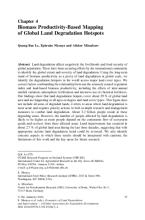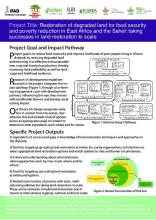/ library resources
Showing items 1 through 9 of 28.The concern for the well-being of land is often directly related to one’s proximity to the land, be it physically, economically or culturally. Land is more precious if one’s livelihood depend on it immediately than if one is merely a visitor.
This report provides a brief summary of the discussions in and key findings of the Global Land
Outlook Writeshop that took place 11th - 13th of April 2016 in Amman, Jordan. The writeshop was
organized the CGIAR Research Program on Dryland Systems, in collaboration with the United
Land degradation affects negatively the livelihoods and food security of
global population. There have been recurring efforts by the international community
to identify the global extent and severity of land degradation. Using the long-term
Project goal is to reduce food insecurity and improve livelihoods of poor people living in African
drylands by restoring degraded land
and returning it to effective and sustainable
tree, crop and livestock production, thereby
increasing land profitability as well as landscape
Land is front and center of the sustainable
development and climate change debates. A
goal dedicated to Land Degradation Neutrality
(LDN) (see Box 1) was endorsed in 2015 by the
United Nations (UN) General Assembly as part
of the Sustainable Development Goals (SDGs)
With around one third of the world’s arable land degraded, estimated annual losses of 6.3 to 10.6 USD trillion, and a projected need to increase food production from land by 70 per cent by 2050, we simply cannot afford to neglect the loss of potential production from careless land management.
Agenda of the Closing workshop on 'the assessment of the economics of land degradation in Central Asia' project, on 28-29 November 2016
Policy recommendations on sustainable land management in Uzbekistan, including costs and benefits of alternative options. Conclusion: Diversifying agricultural production, retaining biomass in the field, and planting strips of forest can lead to economic and environmental benefits.
Policy recommendations on sustainable land management in Tajikistan, including costs and benefits of alternative options. Conclusion: Implementing no-till technology and intensifying gardening productivity creates economic benefits while reducing land degradation.
Pagination
Land Library Search
Through our robust search engine, you can search for any item of the over 73,000 highly curated resources in the Land Library.
If you would like to find an overview of what is possible, feel free to peruse the Search Guide.









